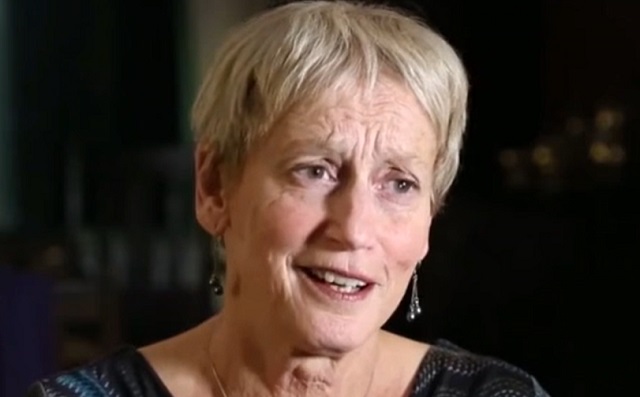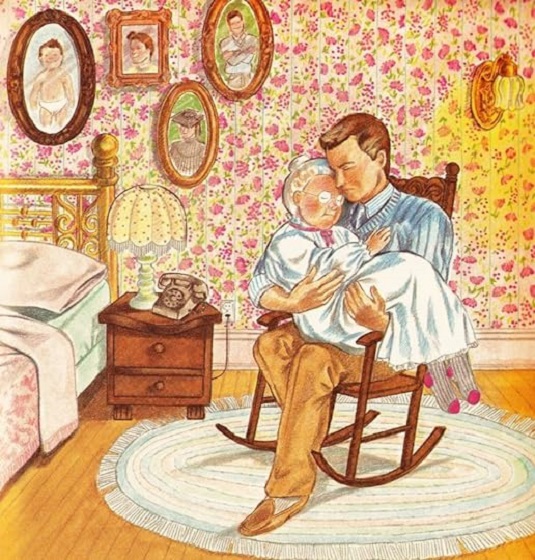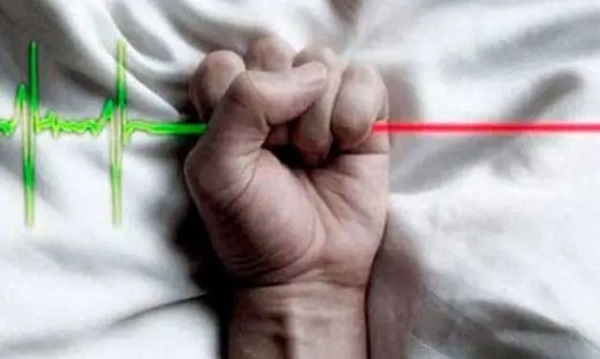Great Reset
Canadian euthanasia doctor takes delight in having killed hundreds through assisted suicide

Ellen Wiebe
From LifeSiteNews
“I know the exact number,” she told Kirkey, but didn’t want to provide it. “It’s become a weird thing, people talking about their numbers, or criticizing people who talk about their numbers.”
The National Post’s July 6 profile of euthanasia doctor and abortionist Ellen Wiebe begins with a barnburner line: “Dr. Ellen Wiebe has never shied away from speaking publicly about the act of ending someone’s life.” That’s a bit of an understatement — Wiebe has positively reveled in it. In the recent BBC documentary Better Off Dead? Wiebe informed disability rights activist Liz Carr that killing patients “is the very best work I’ve ever done.”
Wiebe’s enthusiasm — and chuckling throughout the interview — made viewers very uncomfortable. Clearly, so is National Post writer Sharon Kirkey. The profile of Wiebe is titled “This doctor has helped more than 400 patients die. How many assisted deaths are too many?” Of course, Wiebe hasn’t “helped people die.” She has actively ended their lives by lethal injection. She now realizes that people recoil from that fact. “I know the exact number,” she told Kirkey, but didn’t want to provide it. “It’s become a weird thing, people talking about their numbers, or criticizing people who talk about their numbers.”
“Hundreds is good,” she added. As Kirkey noted, Wiebe had ended at least 430 lives by May 2022, according to her own testimony before a special parliamentary committee on MAiD.
Wiebe has accrued many nicknames — the “pro-choice doctor providing peaceful deaths,” and a “de facto ambassador” of MAiD, for example. Unsurprisingly, she insists that the killing she does be carefully cloaked in Orwellian language. “In Canada, we don’t use the word euthanasia,” she told a podcaster. “That’s what we use for our pets. Here, we call it assisted dying.” Still, Kirkey notes that not everyone is happy about the work she finds so rewarding. She told Scottish euthanasia advocates that “we know that angry family members are our greatest risk” because they are most likely to bring complaints against euthanasia practitioners.
Indeed, as Kirkey notes, Wiebe is willing to bend the rules:
She’s published numerous papers in the assisted dying space, mentoring other doctors and hosting MAID training webinars, but has also been accused of bullying and sneaking her way into faith-based facilities. She’s faced multiple complaints against her to the College of Physicians and Surgeons of British Columbia. but has always been found in compliance with the rules …
Wiebe has had several complaints lodged against her, including her provision of death in the case of “Ms. S,” a 56-year-old woman with advanced multiple sclerosis who, in 2017, starved herself to meet eligibility criteria that her death was “reasonably foreseeable,” a case with eerie echoes to the 27-year-old autistic Calgary woman who stopped eating and drinking in May over a judge’s order blocking her access to MAiD.
In 2017, Wiebe was accused of “borderline unethical” behaviour for entering Vancouver’s Louis Brier Home & Hospital, an Orthodox Jewish long-term care home, and providing MAID to 83-year-old cancer patient Barry Hyman, despite knowing the facility did not allow assisted deaths on its site. Hyman’s family had invited Wiebe in to honour his wish to die in his room. As Wiebe assembled her prepared syringes, “My heart was racing that someone would open the door,” Hyman’s daughter, Lola, told The Globe and Mail.
The same year, the chief medical officer and coroner with B.C.’s coroner’s service raised questions about Wiebe’s provision of MAID to a woman with dementia.
As she told journalist Peter Stockland in 2018, her practice comes “right up to the edge of the law but never beyond.” Thus far, at least, the authorities have agreed with her.
Although Wiebe is 72 and suffers from a heart condition, she’s determined to continue the work she believes in the most — euthanasia and abortion. Euthanasia, in particular, she says, is “the last thing I’ll give up,” and both euthanasia and abortion are “about honouring people’s wishes, empowering people to have control over their own lives. It’s wonderful that I have the opportunity to do that.” Kirkey notes that, as in the BBC documentary, Wiebe grinned and laughed in her interview with the National Post. “I love life,” she told Kirkey.
Disturbingly, Wiebe isn’t the only euthanasia practitioner who enjoys her work. Kirkey noted that in “one study, MAiD providers with between 12 and 113 assisted deaths each described the delivery of a medical death as ‘heartwarming,’ ‘the most important medicine I do,’ ‘an ultimate act of compassion,’ ‘liberating’ and ‘almost an adrenaline rush. I was surprised at how good I felt.’” As Christopher Lyon, a social scientist at the University of York, observed, this is jarring “because death is usually a deeply painful or difficult moment for the patients and their loved ones.” As Kirkey noted:
Lyon’s 77-year-old father died by MAiD in a Victoria hospital room in 2021, over the family’s objections. (Wiebe was not the provider.) His father had bouts of depression and suicidal thinking but was approved for MAiD nonetheless. Lyon wonders what draws some providers to MAiD “and what happens to a person when killing becomes a daily or weekly event.”
“Some providers have counts in the hundreds — this isn’t normal, for any occupation,” he said. “Even members of the military at war do not typically kill that frequently. I think that’s a question that we’ve not really ever asked.”
Wiebe says she didn’t plan to be a euthanasia practitioner — she grew up in a conservative, Bible-believing Mennonite home in Alberta but abandoned faith by age 17 — but has been long committed to the medicalized killing. In her work as an abortionist, she did “pioneering work on medical abortions and bringing trials of the abortion drug, mifepristone, to Canada.” When the Supreme Court legalized euthanasia, she wanted in. “I called up a friend who was also an abortion provider and said, ‘Palliative care is not going to do the work. We better figure out how to get trained and get in there,’” she told the National Post.
She and her abortionist colleague went to the Netherlands in 2016 to meet with euthanasia practitioners and learn the trade. “Now it’s half my clinical work and very, very important,” she said. Unsurprisingly, she has repeatedly said that she sees much similarity between abortion and euthanasia. Family members, she tells the National Post, are often shocked by how swiftly death comes after she administers the lethal injection. “When everybody is ready, I say, ‘Okay, ready to go to sleep?’” she recounted, apparently unaware of how similar this sounds to putting a pet to sleep. The entire process, she says, usually takes about five minutes.
Wiebe believes that Canada’s euthanasia regime will only expand in the years ahead. Kirkey writes:
She fully anticipates that MAiD will be extended to mature minors. “I’ve always been assuming for eight years that a 17-year-old with terminal cancer is going to say, ‘I have the right,’ and of course any judge in the country will say, ‘Yes, you do.’” She also expects some form of advance requests for MAiD in cases of dementia, which would allow a person to make a written request for euthanasia that could be honoured later, even if they lose their capacity to make medical decisions for themselves. Support for advance requests is strong, according to polls. But if someone is unable to express how they’re feeling, who decides if they are suffering unbearably — and what if they changed their minds? MAID doctors may be asked to “provide” for someone they have not met before, and with whom they will not be able to communicate. That’s going to be hard for us as providers,” she said. “This will be a new challenge. And I’m up for challenges.”
Wiebe’s predictions and enthusiasm are a warning for Canada. We have seen tens of thousands of Canadians die by lethal injection and many others speak out about how they feel pressured or pushed into euthanasia. It is imperative that Wiebe’s vision for Canada be opposed at every step. Lives depend on it.
MAiD
Famous Canadian children’s author Robert Munsch says he plans to die by euthanasia

Illustration from Robert Munsch classic I Will Love You Forever
From LifeSiteNews
Children’s writer Robert Munsch, diagnosed with dementia, has decided to end his life through euthanasia and has been approved to receive the lethal injection.
Famous Canadian author Robert Munsch has announced that he plans to end his life through euthanasia after being diagnosed with dementia.
In a September 14 interview with the New York Times, 80-year-old Canadian writer Robert Munsch revealed that he has been granted permission to be euthanized as his mind begins to deteriorate due to dementia.
“I’ve had a good life,” he reflected. “I’ve told my stories. Now I want to decide how it ends.”
Munsch is beloved to Canadians for his more than 70 children’s books, including The Paper Bag Princess, Love You Forever, Thomas’ Snowsuit, and Angela’s Airplane.
He has also received a Juno Award, induction into the Order of Canada, a star in Canada’s Walk of Fame, and has two public schools in Ontario named after him.
In 2021, Munsch was diagnosed with dementia, leading him to lose the ability to perform tasks such as riding a bike and driving. Munsch lamented that he wonders if in a year he lose all his mental facilities and become a “turnip” – a denigrating reference to the disabled.
Munsch noted that he can feel his creativity slipping “further and further away.” He added that he plans to end his life “when I start having real trouble talking and communicating. Then I’ll know.”
Sadly, Munsch is hardly the only Canadian to believe that ending his life through euthanasia is the only solution to suffering. In a recent podcast interview, Cardinal Timothy Dolan revealed that euthanasia is not only the “cheapening of human life,” but also removes the power of redemptive suffering.
He revealed that while his mother suffered for a long time in the hospital, she valued her life and would not have ended it prematurely.
“God’s ways are not our ways,” he explained, noting that sometimes suffering can seem pointless but God always has a greater plan.
Similarly, Bishop Joseph Strickland explained that “True compassion does not eliminate suffering by eliminating the one who suffers. Rather, it means walking with the sick and dying and offering authentic palliative care, emotional support, and spiritual accompaniment. It is in these moments – when we are most vulnerable – that we must be reminded that our worth is not measured by our health, our productivity, or our independence, but by the fact that we are beloved children of God who are made in His image and likeness.”
The dangerous effects of a euthanasia culture are visible in Canada, where patients are waitlisted for health care but have ready access to euthanasia.
The most recent reports show that euthanasia is the sixth-highest cause of death in Canada. However, it was not listed as such in Statistics Canada’s top 10 leading causes of death from 2019 to 2022.
According to Health Canada, in 2022, 13,241 Canadians died by euthanasia lethal injections. This accounts for 4.1 percent of all deaths in the country for that year, a 31.2 percent increase from 2021.
Health
MAiD should not be a response to depression

This article supplied by Troy Media.
Canadians need real mental health support, not state-sanctioned suicide
If the law Parliament plans to roll out in 2027 had been on the books 15 years ago, Member of Parliament Andrew Lawton says he’d probably be dead. He’s not exaggerating. He’s referring to Canada’s scheduled expansion of medical assistance in dying (MAiD) to include people suffering only from mental illness.
Lawton, who survived a suicide attempt during a period of deep depression, knows what’s at stake. So do others who’ve shared similar stories. What they needed back then wasn’t a government-approved exit plan. They needed care, time, and something MAiD quietly discards: the possibility of recovery.
MAiD, medical assistance in dying, was legalized in Canada in 2016 for people with grievous and irremediable physical conditions. The 2027 expansion would, for the first time, allow people to request MAiD solely on the basis of a mental illness, even if they have no physical illness or terminal condition.
With the expansion now delayed to March 2027, Parliament will once again have to decide whether it wants to cross this particular moral threshold. Although the legislation was passed in 2021, it has never come into force. First pushed back to 2024, then to 2027, it remains stalled, not because of foot-dragging, but due to intense medical, ethical and public concern.
Parliament should scrap the expansion altogether.
A 2023 repeal attempt came surprisingly close—just 17 votes short, at 167 to 150. That’s despite unanimous support from Conservative, NDP and Green MPs. You read that right: all three parties, often at each other’s throats, agreed that death should not be an option handed out for depression.
Their concern wasn’t just ethical, it was practical. The core issues remain unresolved. There’s no consensus on whether mental illness is ever truly irremediable—whether it can be cured, improved or even reliably assessed as hopeless. Ask 10 psychiatrists and you’ll get 12 opinions. Recovery isn’t rare. But authorizing MAiD sends the opposite message: that some people’s pain is permanent, and the only answer is to make it stop—permanently.
Meanwhile, access to real mental health care is sorely lacking. A 2023 Angus Reid Institute poll found 40 per cent of Canadians who needed treatment faced barriers getting it. Half of Canadians said they outright oppose the expansion. Another 21 per cent weren’t sure—perhaps assuming Canada wouldn’t actually go through with something so dystopian. But 82 per cent agreed on one thing: don’t even think about expanding MAiD before fixing the mental health system.
That disconnect between what people need and what they’re being offered leads to a more profound contradiction. Canada spends millions promoting suicide prevention. There are hotlines, campaigns and mental health initiatives. Offering MAiD to people in crisis sends a radically different message: suicide prevention ends where bureaucracy begins.
Even Quebec, normally Canada’s most enthusiastic adopter of progressive policy experiments, has drawn the line. The province has said mental disorders don’t qualify for MAiD, period. Most provincial premiers and health ministers have called for an indefinite delay.
Internationally, the United Nations Committee on the Rights of Persons with Disabilities has condemned Canada’s approach and urged the government not to proceed. Taken together, the message is clear: both at home and abroad, there’s serious alarm over where this policy leads.
With mounting opposition and the deadline for implementation approaching in 2027, Parliament will again revisit the issue this fall.
A private member’s bill from MP Tamara Jansen, Bill C-218, which seeks to repeal the 2027 expansion clause, will bring the issue back to the floor for debate.
Her speech introducing the bill asked MPs to imagine someone’s child, broken by job loss or heartbreak, reaching a dark place. “Imagine they feel a loss so deep they are convinced the world would be better off without them,” she said. “Our society could end a person’s life solely for a mental health challenge.”
That isn’t compassion. That’s surrender.
Expanding MAiD to mental illness risks turning a temporary crisis into a permanent decision. It treats pain as untreatable, despair as destiny, and bureaucracy as wisdom. It signals to the vulnerable that Canada is no longer offering help—just a final form to sign.
Parliament still has time to reverse course. It should reject the expansion, reinvest in suicide prevention and reassert that mental suffering deserves treatment—not a state-sanctioned exit.
Daniel Zekveld is a Policy Analyst with the Association for Reformed Political Action (ARPA) Canada.
Explore more on Euthanasia, Assisted suicide, Mental health, Human Rights, Ethics
Troy Media empowers Canadian community news outlets by providing independent, insightful analysis and commentary. Our mission is to support local media in helping Canadians stay informed and engaged by delivering reliable content that strengthens community connections and deepens understanding across the country.
-

 Alberta2 days ago
Alberta2 days agoBreak the Fences, Keep the Frontier
-

 Business2 days ago
Business2 days agoCarney’s ‘major projects’ list no cause for celebration
-

 Alberta2 days ago
Alberta2 days agoAlberta Education negotiations update: Minister Horner
-

 Business1 day ago
Business1 day agoRed tape is killing Canadian housing affordability
-

 Opinion2 days ago
Opinion2 days agoRFK Jr. Reveals Unforgettable Details About Charlie Kirk in Emotional Tribute
-

 Business2 days ago
Business2 days agoGlobal elites insisting on digital currency to phase out cash
-

 Health1 day ago
Health1 day agoMAiD should not be a response to depression
-

 2025 Federal Election1 day ago
2025 Federal Election1 day agoPost election report indicates Canadian elections are becoming harder to secure








